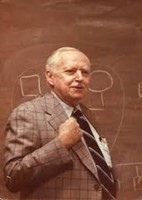Authored by Robin Shultz, D.S.W.
In 1988, Dr. Murray Bowen stated in the book, Family Evaluation:
 “We continuously admonish ourselves for what we do or do not do and continually implore each other to be different. There appears to be an infinite supply of people available to tell us the ‘right’ way to think and the ‘right’ way to act. The vast majority of the admonitions and directives that swirl around us are hopelessly entangled in subjectivity. Depending on the phenomenon under consideration, we blame some thing, some person, some group, some whatever for its presence. We blame genes, chemicals, parents, schools, a variety of ‘bad’ influences, and certain politicians for what goes wrong. Probably the most important subjectivity determined block to observing human behavior has been the earlier described difficulty in seeing the part oneself plays in the functioning of others. Our conceptualizations of human behavior have consistently deemphasized the process between people and focused on the process within people”. – Kerr, M.E. & Bowen, M., 1988. Family Evaluation, p. 18.
“We continuously admonish ourselves for what we do or do not do and continually implore each other to be different. There appears to be an infinite supply of people available to tell us the ‘right’ way to think and the ‘right’ way to act. The vast majority of the admonitions and directives that swirl around us are hopelessly entangled in subjectivity. Depending on the phenomenon under consideration, we blame some thing, some person, some group, some whatever for its presence. We blame genes, chemicals, parents, schools, a variety of ‘bad’ influences, and certain politicians for what goes wrong. Probably the most important subjectivity determined block to observing human behavior has been the earlier described difficulty in seeing the part oneself plays in the functioning of others. Our conceptualizations of human behavior have consistently deemphasized the process between people and focused on the process within people”. – Kerr, M.E. & Bowen, M., 1988. Family Evaluation, p. 18.
These statements made in 1988 continue to hold truth today. Seeing the part one plays in relationships, whether they be individual, organizational, familial, or societal, is difficult, as doing so requires viewing problems from a position of self-responsibility and personal accountability. As Bowen suggested in the above piece, our society has both learned and reinforced conceptualizing human behavior as an individualized internal process existing within a person rather than as a series of reciprocal exchanges between persons which occur within specific situational contexts. This difference in interpretation of how problems develop and maintain themselves over time matters.
Relationship challenges viewed from the “individual” perspective will continue to place the problem somewhere “out there”, while viewing the problem from a “systems” stance provides the opportunity to look inward, develop self, and concentrate on the one thing they do have control over in their lives – themselves. This shift in thinking alone can often contribute to shifts in the relationship that the individual seeks to change.
Learning a different way of thinking, changing one’s perspective from an individual focus to a systems perspective, takes time and practice. Experiencing new insights and seeing more options available to support change in self and in one’s own systems, motivates even the most impatient of students to keep taking deeper dives into this rich theory. Participants in the CFC post-graduate training program in Bowen Family Systems Theory engage in a continuous immersive experience that allows them to not only learn the fundamentals of Bowen theory, but also to experience “thinking systems” in all of their most significant systems.
Students meet one day a month to engage in discussions related to core curriculum, lectures, videos, and case study presentations, as well as to participate in family of origin consultations led by faculty members. These small group experiences allow each student to be both a participant engaging in one’s own family of origin work, and an observer as a faculty member conducts the process of facilitating family of origin work for another individual. This experience has been reported by graduates of the program as invaluable to the development of their own facilitation skills for use in clinical practice.
Between monthly sessions, students are expected to complete readings and/or video assignments in preparation for upcoming meetings and to prepare writing assignments in reaction to topics covered during the prior month’s meeting. Second year students are expected to prepare and present a final paper on a topic of their choosing demonstrating their understanding of Bowen theory.
Students who choose to continue learning beyond the two-year program are encouraged to design their own assignments, areas of study, and styles of presentations. The two-year training program in Bowen theory includes attendance at three conferences per year with conference fees included as part of the program’s tuition. Attendance at the three conferences is considered part of the training program and is required.
Learning to “think systems” is an example of life-long learning, in which benefits keep accruing over time. Bowen theory is relevant throughout the developmental stages of the lives of individuals and into future generations of families.




Leave a Reply